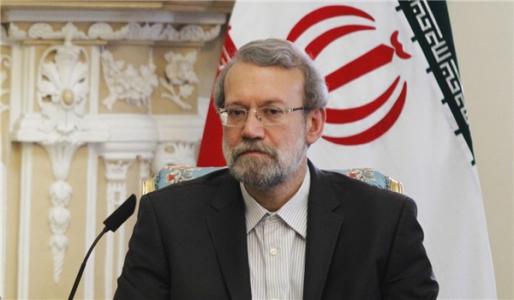Economic independence is not tantamount to slamming the doors shut to the world, said Parliament Speaker Ali Larijani.
Speaking at a national conference on resistance-based economy in Tehran, the top MP said, “There is no ambiguity in the general policies of the resistance-based economy; the problem lies in how such policies should be implemented. It’s inaccurate to think that the Expediency Council’s formulation of policies to create a resistance-based economy has come as a result of sanctions.”
What appears below is a partial translation of a report that the Islamic Republic News Agency filed on February 17 about what else Larijani said at the congress:
“Sanctions might have opened the wound of our ailing economy, but our economic problems are old. That’s why only policies put forth by a resistance-based economy can address them. […] Before sanctions, unemployment was high; today 44 percent of our graduates are jobless. We must try to tackle these issues. State employment is the worst solution. Responsibilities should be delegated to the private sector so that the economy is run by the public.”
Stating that today’s economic problems are the very same ones we had 100 years ago, he said, “That the late Ayatollah Modarres [a notable supporter of the Iranian Constitutional Revolution] said the government cannot be a good employer and it should not be in charge of economy has nothing to do with sanctions; in fact it is wrong to think that the government should lead the development drive. The late cleric would always suggest that production should be done at home so that we could be independent. […]”
On general policies of the resistance-based economy, Article 44 and engagement of the public in economic activities, he said, “The public was supposed to be given a role on the economic front to promote competition and productivity. However, today we are still dealing with these problems. The policies envisaged in Article 44 were designed to get the public involved in the economy, yet they have not been implemented well over the last decade and these flaws need to be fixed.”
He went on to say, “Sometimes doctoral theses aimed at addressing production shortcomings are turned down. As a result, university students do not opt for such topics. In the industry sector, thanks to the absence of a competitive atmosphere, no need for the presence of universities is felt. […] We owe our progress in nuclear and nanotechnology arenas to the involvement of universities.”
Stressing that security independence would be in place when others could not interfere in our security, he stated, “Economic independence does not mean that we sever our ties with others; rather it means that their influence in our political decision-making is diminished. […]”
Larijani concluded, “Economic independence means that enemies should not interfere with our economy. There have to be relations, yet if we fail to secure economic independence, we won’t be immune to mischief by others.”
At the congress, a number of books and products related to the resistance-based economy were unveiled.
